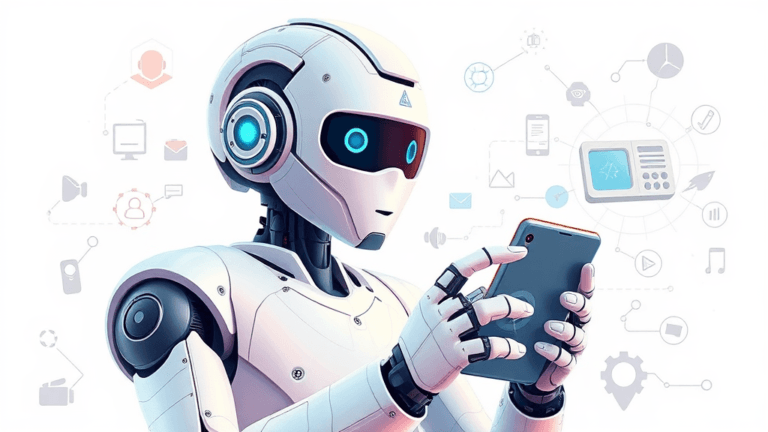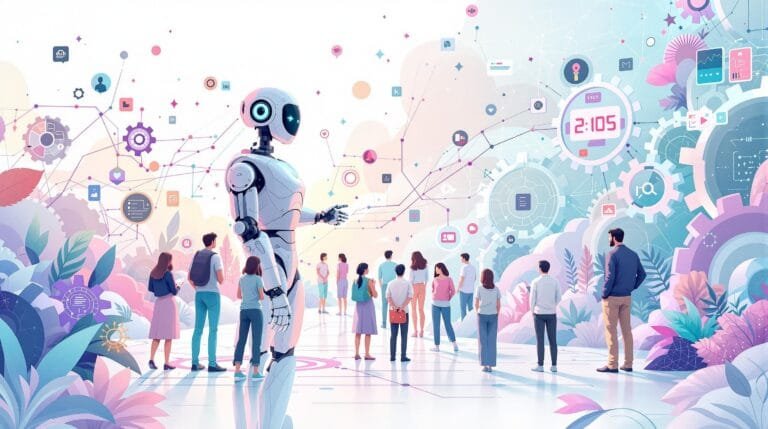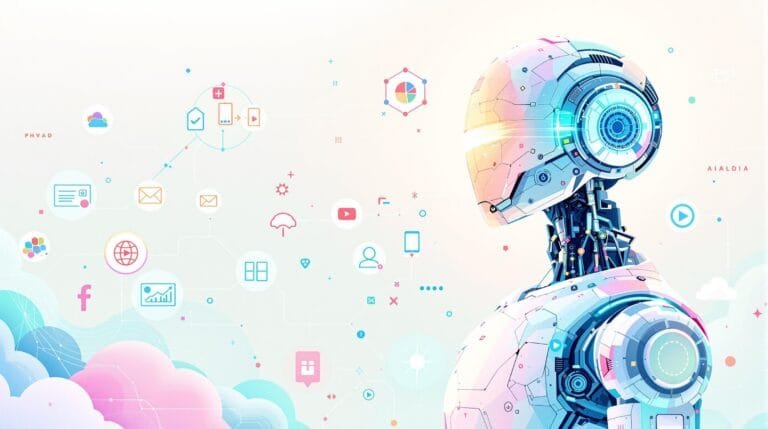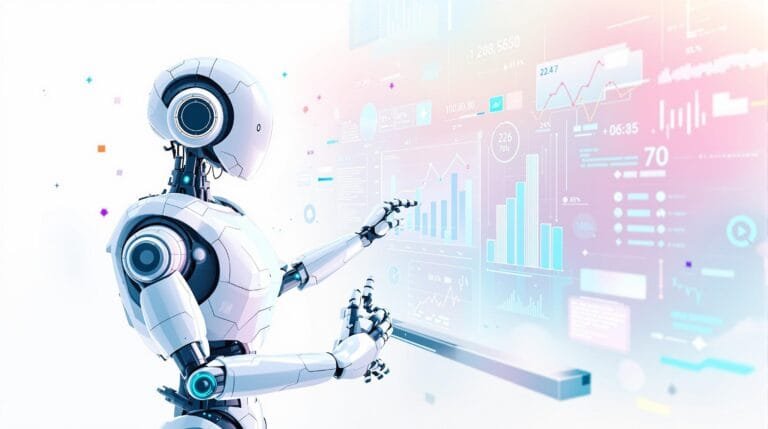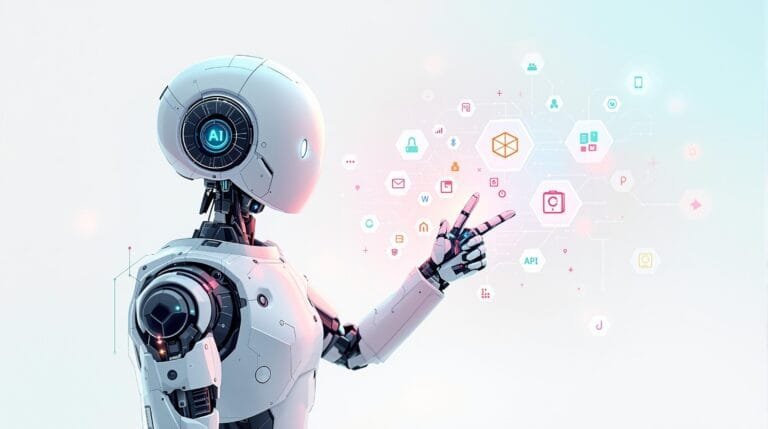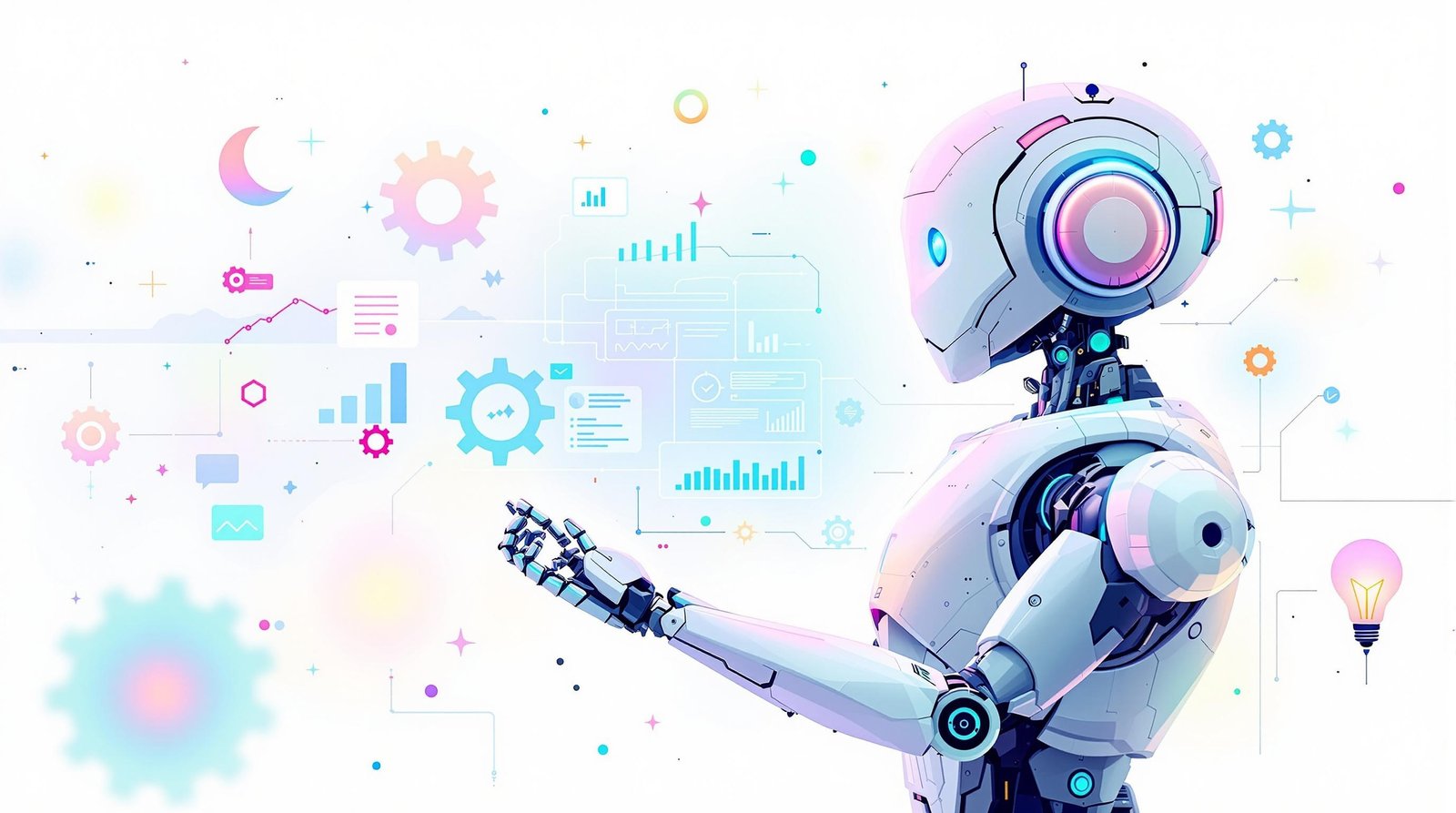
AI Technology for Businesses: Unlocking Full Automation and Customized Solutions
Estimated reading time: 12 minutes
Table of Contents
- Understanding AI Automation Services: The Engine Behind Smarter Workflows
- AI Automation for Business: Where Machines Shine
- Customized AI Solutions: Because One Size Doesn’t Fit All
- Achieving Full AI Automation: From Piecemeal to Powerhouse
- AI-Powered Business Solutions: Tools That Think
- Choosing the Right Automation Software: No More Guesswork
- Implementing Tailored Automation Systems: A Step-by-Step Guide
- Benefits of AI Technology for Businesses: Beyond the Hype
- AI-Powered Business Solutions: Your Digital Swiss Army Knife
- Choosing the Right Automation Software: Don’t Marry the First Date
- Implementing Tailored Automation Systems: Building Your AI Orchestra
- Benefits of AI Technology for Businesses: Beyond the Hype
- Conclusion: The Future Is Automated—Are You Riding the Wave?
- FAQs: Cutting Through the AI Fog
Have you ever wondered how some companies seem to operate like well-oiled machines, effortlessly scaling their operations while keeping costs low? The secret sauce often lies in AI technology for businesses—a game-changer that’s reshaping industries from retail to manufacturing. By 2025, 89% of organizations expect AI and machine learning to drive revenue growth, streamline operations, and elevate customer experiences Pew Research. But what exactly does this mean for your business? Let’s dive in.
AI technology for businesses refers to tools like machine learning, natural language processing (NLP), and computer vision that automate tasks, analyze data, and deliver insights faster than any human could. Think of it as hiring a team of super-efficient digital employees who never sleep. From chatbots answering customer queries to algorithms predicting inventory needs, AI automation for business AI Automation For Business Success isn’t just a trend—it’s the future of competitive advantage Investopedia.
Understanding AI Automation Services: The Engine Behind Smarter Workflows
AI automation services AI Automation Services Game Changer are like the Swiss Army knives of the corporate world. These platforms use artificial intelligence to handle repetitive tasks, analyze data patterns, and even make decisions. Imagine a system that processes invoices, schedules meetings, and answers customer emails—all while your team focuses on creative problem-solving.
Key Benefits of AI Automation
- Boosted productivity: Automating tasks like data entry or report generation saves hundreds of hours monthly.
- Fewer errors: Machines don’t get tired, reducing costly mistakes in tasks like financial calculations.
- Cost efficiency: Optimize resource use—like using AI to predict energy needs in manufacturing.
- Scalability: Handle 10 or 10,000 customer inquiries without hiring more staff Rippling.
For example, a retail company might use automation software AI Automation Software Business Success to manage inventory. Instead of manually tracking stock levels, AI predicts demand spikes based on weather, trends, and historical data. The result? Fewer overstocked shelves and happier customers.
Ready to streamline your workflows? Explore Our Services to Automate Your Business.
AI Automation for Business: Where Machines Shine
From chatbots to predictive analytics, AI automation for business is transforming every corner of operations. Let’s break down the most impactful applications:
Customer Service: 24/7 Support Without the Coffee Breaks
- Chatbots: Handle routine queries like order tracking or returns, freeing agents for complex issues.
- Sentiment analysis: Detect frustration in customer emails and prioritize urgent cases.
- Automated ticketing: Route IT support requests to the right team instantly.
Marketing: Personalization at Scale
- Dynamic ads: Show different creatives to teens vs. retirees based on browsing behavior.
- Predictive campaigns: Use past data to forecast which products will trend next quarter.
Supply Chain: Smarter, Faster, Leaner
- Demand forecasting: AI predicts how many umbrellas to stock before monsoon season.
- Predictive maintenance: Alert factories about machinery issues before breakdowns occur.
| Business Area | AI Application | Impact |
|---|---|---|
| Customer Service | Chatbots + Sentiment Analysis | 40% faster response times |
| Marketing | Personalized Ad Targeting | 30% higher conversion rates |
| Supply Chain | Predictive Maintenance | 25% reduction in downtime |
Take Netflix, for instance. Their recommendation engine—powered by AI-powered business solutions AI Powered Business Solutions Guide—drives 80% of watched content, keeping subscribers glued to their screens U.S. Chamber of Commerce.
Want to predict your next big opportunity? Boost Your Business Efficiency with Our Automated SMS Service. Contact us Today.
Customized AI Solutions: Because One Size Doesn’t Fit All
Ever tried wearing someone else’s shoes? That’s what using generic AI tools feels like for many businesses. Customized AI solutions Customized AI Solutions Businesses are tailored to your unique workflows, data, and goals.
Why Off-the-Shelf Tools Fall Short
- Integration headaches: Legacy systems might not “talk” to pre-built AI platforms.
- Industry-specific needs: A hospital’s AI must comply with HIPAA; a bank’s needs fraud detection.
- Scaling challenges: A startup’s AI must grow as fast as its user base.
Success Stories: Tailored Wins
- Medallia: Built an IT support assistant that resolved issues in seconds (vs. days) MoveWorks.
- Broadcom’s 1.Bot: Handles 57% of IT tickets autonomously across multiple departments.
| Custom AI vs. Generic | Custom AI | Generic Software |
|---|---|---|
| Integration | Seamless with existing systems | Limited compatibility |
| Flexibility | Adapts to unique processes | Rigid workflows |
| ROI | Higher long-term value | Short-term fixes |
Achieving Full AI Automation: From Piecemeal to Powerhouse
Full AI automation isn’t about replacing humans—it’s about creating a symphony where humans and machines collaborate. Picture a logistics company where AI predicts delivery routes, drones handle last-mile drops, and managers focus on strategic partnerships.
Roadmap to Full Automation
- Audit processes: Identify repetitive tasks (e.g., data entry, inventory checks).
- Start small: Pilot AI in one department, like automating HR onboarding.
- Scale smart: Expand to finance (invoice processing) and customer service (chatbots).
- Connect the dots: Integrate systems so sales data automatically informs production schedules.
A fully automated supply chain might use:
- IoT sensors to track shipments
- Machine learning to predict delays
- Robotic process automation (RPA) to update inventory databases
Dreaming of a self-running workflow? Let’s Build Your Custom AI Solution.
AI-Powered Business Solutions: Tools That Think
The market is flooded with AI-powered business solutions, but the best ones feel like having a crystal ball. Here’s what to look for:
Top AI Platforms
| Tool | Best For | Key Feature |
|---|---|---|
| IBM Watson | Data Analysis | NLP for unstructured data |
| Salesforce Einstein | CRM | Predictive lead scoring |
| Google Cloud AI | Machine Learning | Custom model building |
These tools excel at turning data into decisions. For example, a marketing team using Salesforce Einstein can predict which leads are most likely to convert, saving hours of cold calling.
Choosing the Right Automation Software: No More Guesswork
Picking automation software is like dating—compatibility matters. Here’s how to find “the one”:
Must-Have Features
- Low-code interfaces: Let non-techies build workflows.
- APIs: Connect to your existing CRM, ERP, or email tools.
- Scalability: Grows from 100 to 100,000 users without hiccups.
Pitfalls to Avoid
- Over-customization: Don’t reinvent the wheel; adapt what works.
- Ignoring security: Ensure GDPR/CCPA compliance for customer data.
Implementing Tailored Automation Systems: A Step-by-Step Guide
- Map processes: Document every step of, say, order fulfillment.
- Train AI models: Feed it historical data to predict shipping delays.
- Test rigorously: Run simulations before going live.
- Iterate: Use employee feedback to tweak workflows.
A bakery might start by automating ingredient orders based on AI predictions, then expand to personalized marketing emails for gluten-free customers.
Benefits of AI Technology for Businesses: Beyond the Hype
Why are companies racing to adopt AI technology for businesses? The perks are undeniable:
- 24/7 operations: Chatbots handle nightshift customer queries.
- Data-driven decisions: No more “gut feeling” investments.
- Happier employees: Less time on mundane tasks, more on innovation.
Take it from a local bookstore that used AI to recommend books. Sales jumped 20%—proof that even small businesses win big Harvard Business School Online.
Curious how AI could transform your business? Let’s Chat About Your Goals.
From automating invoices to predicting market trends, AI technology for businesses isn’t just a luxury—it’s the key to staying relevant. Whether you’re a startup or a Fortune 500 company, the question isn’t if you should adopt AI, but how fast.
AI-Powered Business Solutions: Your Digital Swiss Army Knife
Imagine having a toolbox that not only contains every tool you need but also predicts which ones you’ll use next. That’s the magic of AI-powered business solutions—they combine machine learning, natural language processing, and robotic task automation to turn data into decisions. Whether you’re a small bakery predicting cupcake demand or a hospital optimizing patient schedules, these tools adapt to your needs like a chameleon changes colors AI Powered Business Solutions Guide.
What Can AI Solutions Do?
- Predict trends: Spot sales patterns months before they’re obvious to humans.
- Understand language: Analyze customer reviews to detect frustration or praise.
- See like humans (but better): Inspect products for defects using computer vision.
- Automate workflows: Handle invoice processing while your team sleeps.
| AI Tool | Best For | Superpower |
|---|---|---|
| IBM Watson | Data detective work | Reads unstructured data (emails, reports) |
| Salesforce Einstein | Customer relationships | Predicts which leads will convert |
| Google Cloud AI | Custom AI models | Builds machine learning systems fast |
| Microsoft Azure AI | Cloud-based automation | Connects AI to existing office tools |
| AWS AI | All-in-one toolkit | Offers pre-built models for quick starts |
Take the case of a furniture retailer using Salesforce Einstein. By analyzing past purchases, the AI suggested personalized room setups to customers, boosting upsells by 35% TechTarget. Meanwhile, hospitals use IBM Watson to scan thousands of medical papers in seconds, helping doctors pinpoint rare diagnoses.
Want a solution that fits like a glove? Explore Our Custom AI Tools.
Choosing the Right Automation Software: Don’t Marry the First Date
Selecting automation software is like hiring a new team member—you need someone who meshes with your company’s personality. A flashy tool that can’t integrate with your CRM is about as useful as a bicycle underwater.
The 7-Point Checklist
- Does it speak your language? Look for tools that connect to your existing systems (like QuickBooks or Slack).
- Can it grow with you? Choose platforms that handle 10 users today and 10,000 tomorrow.
- Is it user-friendly? If your grandma can’t navigate it, keep looking.
- Security first: Ensure it meets GDPR, HIPAA, or other industry standards.
- Support matters: 24/7 chat support beats email tickets that vanish into the void.
- Cost transparency: Watch for hidden fees—implementation costs can bite.
- Proven track record: Check reviews from businesses in your niche.
Red Flags to Avoid
- One-size-fits-all claims: Your flower shop has different needs than a cybersecurity firm.
- No trial period: Never commit without test-driving the software.
- Vague ROI promises: Demand concrete metrics like “cuts processing time by 40%.”
A logistics company learned this the hard way. They chose a “popular” inventory tool that couldn’t handle multiple warehouses. After six months of glitches, they switched to a customizable platform, saving $120k annually in lost shipments Pulpstream.
Implementing Tailored Automation Systems: Building Your AI Orchestra
Creating tailored automation systems Tailored Automation Systems Efficiency is like conducting a symphony—every instrument (department) needs to play in harmony. Start by mapping out your existing processes. Is your sales team wasting hours on data entry? Does accounting chase late payments manually?
The 8-Step Playbook
- Audit workflows: Time how long tasks actually take vs. how long they should take.
- Pick your MVP (Minimum Viable Process): Automate invoice approvals before tackling complex supply chains.
- Data spring cleaning: Fix inconsistent formatting (e.g., “CA” vs. “California” in addresses).
- Train your AI: Feed it historical data—the more, the better.
- Design with users: Involve employees in UI decisions to boost adoption.
- Stress-test: Simulate Black Friday-level orders during a quiet Tuesday.
- Roll out gradually: Start with one department, gather feedback, then expand.
- Keep tuning: Update models quarterly as your business evolves.
Medallia’s IT team nailed this approach. They built an AI assistant that resolves 95% of employee tech issues in seconds by learning from past tickets. Problems that once took days now fix themselves MoveWorks.
| Implementation Phase | Time Required | Key Success Factor |
|---|---|---|
| Planning & Analysis | 2-4 weeks | Cross-department buy-in |
| Data Preparation | 1-3 weeks | Clean, labeled datasets |
| Pilot Testing | 4-6 weeks | Real-world scenario tests |
| Full Deployment | 8-12 weeks | Continuous training |
Scaling AI feels overwhelming? Let Our Experts Guide You.
Benefits of AI Technology for Businesses: Beyond the Hype
Why are CEOs losing sleep over AI technology for businesses? Because the gains aren’t incremental—they’re exponential.
The Unbeatable Perks
- 24/7 Productivity: Chatbots never call in sick.
- Eagle-Eyed Accuracy: AI spots billing errors humans glaze over.
- Customer Whisperer: Recommends products so accurately it feels psychic.
- Budget Guardian: Slashes energy costs by optimizing machine schedules.
- Risk Radar: Flags shady transactions before they become headlines.
Consider a mid-sized hotel chain that implemented AI-powered pricing. By analyzing local events, weather, and flight data, they adjusted room rates daily. Occupancy rates jumped 22%, and revenue per available room (RevPAR) soared by 17% Harvard Business School Online.
The Ripple Effect
- Employees: Spend less time on mind-numbing tasks, more on innovation.
- Customers: Get instant responses instead of waiting on hold.
- Planet: Reduce waste through smarter inventory predictions.
Key Takeaways
- AI automation cuts costs by 25-40% in areas like customer service and inventory.
- Custom solutions outperform generic tools through better integration and relevance.
- Successful AI adoption requires careful planning, clean data, and employee input.
- Businesses using AI report 30% faster decision-making and 20% higher customer satisfaction.
- The right AI tools act as force multipliers, scaling operations without proportional costs.
Conclusion: The Future Is Automated—Are You Riding the Wave?
Let’s be real—AI isn’t replacing humans. It’s replacing tasks we never liked doing anyway. The question isn’t whether to automate, but how quickly you can pivot. Companies that drag their feet risk becoming the next Blockbuster in a Netflix world.
Your Action Plan
- Audit: List tasks that drain your team’s creativity.
- Prioritize: Start with quick wins (email sorting, data entry).
- Partner: Work with experts who speak “your language” technically and culturally.
- Iterate: Treat AI like a garden—water it with data, prune it with feedback.
Ready to turn AI from a buzzword into your secret weapon? Explore Pure AI Solutions’ Custom Automation Packages or Chat with Our Team. Let’s build systems that work while you sleep.
FAQs: Cutting Through the AI Fog
1. How much does AI automation cost?
Costs vary from $200/month for basic chatbots to $50k+ for enterprise systems. Most see ROI within 6-18 months through saved labor hours.
2. Can small businesses afford AI?
Absolutely! Many tools offer pay-as-you-go pricing. Start with one process (like email marketing) and scale.
3. Does AI require coding skills?
Not anymore. Low-code platforms let you build workflows visually.
4. How long does implementation take?
Simple bots: 2-4 weeks. Complex systems: 3-6 months.
5. Is AI secure for handling sensitive data?
Yes, when using HIPAA/GDPR-compliant platforms with encryption.
6. Will employees resist AI?
Involve them early. Show how AI eliminates tedious tasks—most become champions.
7. Can AI work with our old software?
Modern tools integrate with legacy systems via APIs.
8. What if the AI makes a mistake?
Humans review critical decisions initially. The system learns from corrections.
9. How do we measure AI success?
Track metrics like process speed, error rates, and customer satisfaction.
10. What’s next after automation?
Predictive AI—anticipating customer needs before they ask.
Still have questions? Get Personalized Advice from Our AI Experts.

